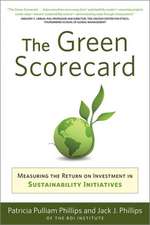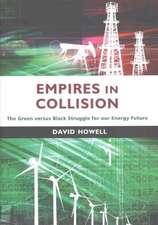Future Electricity Technologies and Systems: Department of Applied Economics Occasional Papers, cartea 67
Editat de Tooraj Jamasb, William J. Nuttall, Michael G. Pollitten Limba Engleză Hardback – 19 iul 2006
Preț: 623.34 lei
Preț vechi: 700.38 lei
-11% Nou
Puncte Express: 935
Preț estimativ în valută:
119.28€ • 127.55$ • 99.45£
119.28€ • 127.55$ • 99.45£
Carte tipărită la comandă
Livrare economică 18 aprilie-02 mai
Preluare comenzi: 021 569.72.76
Specificații
ISBN-13: 9780521860499
ISBN-10: 0521860490
Pagini: 456
Ilustrații: 15 b/w illus. 48 tables
Dimensiuni: 159 x 236 x 35 mm
Greutate: 0.86 kg
Editura: Cambridge University Press
Colecția Cambridge University Press
Seria Department of Applied Economics Occasional Papers
Locul publicării:Cambridge, United Kingdom
ISBN-10: 0521860490
Pagini: 456
Ilustrații: 15 b/w illus. 48 tables
Dimensiuni: 159 x 236 x 35 mm
Greutate: 0.86 kg
Editura: Cambridge University Press
Colecția Cambridge University Press
Seria Department of Applied Economics Occasional Papers
Locul publicării:Cambridge, United Kingdom
Cuprins
Figures; Tables; Notes on contributors; Preface Michael Grubb and Janus Bialek; Acknowledgements; List of abbreviations; 1. New electricity technologies for a sustainable future Tooraj Jamasb, William Nuttall and Michael Pollitt; 2. Electricity network scenarios for the UK in 2050 Ian Elders, Graham Ault, Stuart Galloway, Jim McDonald, Jonathan Köhler, Matthew Leach and Efterpi Lampaditou; 3. Wind power: status and perspectives Poul Erik Morthorst; 4. Solar energy: photovoltaic electricity generation Asim Mumtaz and Gehan Amaratunga; 5. Bioenergy: future prospects for thermal processing of biomass Anthony V. Bridgwater; 6. Wave energy Tom Thorpe and Robin Wallace; 7. CO2 capture, transport and storage for coal, oil and gas: technology overview Nils A. Røkke; 8. Nuclear energy Malcolm C. Grimston; 9. Miniaturisation of the electricity generation industry: issues, technologies and potential Andreas Biermann; 10. Superconductors in the electrical power industry A. M. Campbell; 11. The role of power electronics in future power systems T. C. Green and C. A. Hernández Arámburo; 12. Sustainable hydrogen energy Peter P. Edwards, Vladimir L. Kuznetsov, Simon R. Johnson, Matthew T. J. Lodge and Martin Owen Jones; 13. Electrical energy storage A. J. Ruddell; 14. End-use technologies - main drivers and patterns of future demand: buildings Wolfgang Eichhammer; 15. Industry Lynn Price, Christina Galitsky and Ernst Worrell; 16. Transport Pieter Vermeyen and Ronnie Belmans; 17. Prospects for smart metering in the UK Hannah Devine-Wright and Patrick Devine-Wright.
Recenzii
'This is an invaluable source book for the energy technologies that will see us into the second half of the 21st century. Without increasing supplies of clean energy we will languish and stagnate. Only new technology can supply our insatiable demand for energy and fuel economic growth.' Ian Fells CBE FREng FRSE
'This book provides a series of well-informed and objective reviews of new and emerging technologies for supplying and using electricity in ways that would greatly reduce greenhouse gas emissions into the atmosphere. The range of options reviewed is wide, each of which is dealt with in a digestible and non-technical way: onshore and offshore wind; solar photovoltaics; bio-energy; wave energy; combined heat and power, both large and small scale; nuclear energy; new micro-generation technologies; carbon capture and storage from the use of fossil fuels; hydrogen production and use; small and large scale options for energy storage both to help shave peak demands and overcome the intermittency problem of some renewable energy sources; energy efficiency in buildings, transport and industry; and new developments in power electronics for the control and management of supply and demand. The picture is one of continual innovation and development arising from the efforts of engineers in many countries. It is to be hoped that the UK will substantially bolster its efforts on R&D and innovation, as the book clearly indicates is needed, since there is no reason why the UK-indeed why any country-could not meet its energy needs while addressing the climate change problem. The costs of the emerging options are higher than-but not far removed from-those of using fossil fuels and, with innovation, can be expected to decline.' Dennis Anderson, Imperial College London
'It's a pleasure to see a book on future electricity systems that foreswears the narrow advocacy of particular technologies and provides an authoritative account of all the options that may be needed in the coming decades. Renewables, nuclear and fossil all have their place in this book which not only deals with demand-side options but places individual technologies in a whole systems context. With energy now a key policy concern, this could become a standard reference for students and practitioners alike.' Jim Skea, Research Director, UK Energy Research Centre
'This book provides a series of well-informed and objective reviews of new and emerging technologies for supplying and using electricity in ways that would greatly reduce greenhouse gas emissions into the atmosphere. The range of options reviewed is wide, each of which is dealt with in a digestible and non-technical way: onshore and offshore wind; solar photovoltaics; bio-energy; wave energy; combined heat and power, both large and small scale; nuclear energy; new micro-generation technologies; carbon capture and storage from the use of fossil fuels; hydrogen production and use; small and large scale options for energy storage both to help shave peak demands and overcome the intermittency problem of some renewable energy sources; energy efficiency in buildings, transport and industry; and new developments in power electronics for the control and management of supply and demand. The picture is one of continual innovation and development arising from the efforts of engineers in many countries. It is to be hoped that the UK will substantially bolster its efforts on R&D and innovation, as the book clearly indicates is needed, since there is no reason why the UK-indeed why any country-could not meet its energy needs while addressing the climate change problem. The costs of the emerging options are higher than-but not far removed from-those of using fossil fuels and, with innovation, can be expected to decline.' Dennis Anderson, Imperial College London
'It's a pleasure to see a book on future electricity systems that foreswears the narrow advocacy of particular technologies and provides an authoritative account of all the options that may be needed in the coming decades. Renewables, nuclear and fossil all have their place in this book which not only deals with demand-side options but places individual technologies in a whole systems context. With energy now a key policy concern, this could become a standard reference for students and practitioners alike.' Jim Skea, Research Director, UK Energy Research Centre
Descriere
An authoritative overview of the main technologies which could shape the future of electricity.























